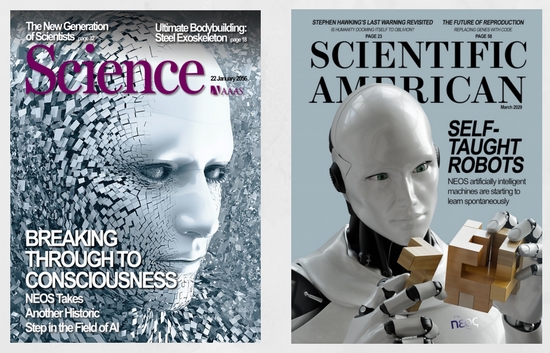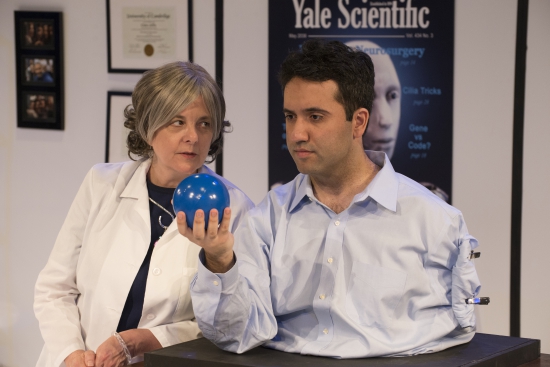Thought provoking play by Thomas Gibbons
What does it really mean to be sentient? If we create a convincing facsimile of a person and use Artificial Intelligence (AI) to reproduce a personality, does the end result truly replace the original person? Or is it a modern-day chimera?
In any case, exactly what sort of legal rights would, or should, such an entity have? How should existing biological family members treat this new being?
Questions such as these (and many more) have kept my husband, Larry, and I chatting for days after seeing Black Flag Theatre Company’s production of “Uncanny Valley,” a thought-provoking play by Thomas Gibbons.

What is the Uncanny Valley?
In case you’re unfamiliar with the term,“Uncanny Valley” refers to the discomfort people feel upon seeing an effigy that looks nearly human. Although the phrase was coined by roboticist Masahiro Mori in 1970, it’s not a new phenomena. For instance, the Uncanny Valley is why some people think realistic looking dolls are creepy. (For more the on the Uncanny Valley, click here.)
Despite our discomfort with the Uncanny Valley, humans have long been intrigued by humanlike creations; consider Pinocchio or Commander Data from Star Trek.
At exactly what point, however, does a machine cease to be merely a machine and attain true sentience? With the acceleration in robotics and AI, this is an increasingly important question for us to answer.
Uncanny Valley by Thomas Gibbons
Aside from the title of the play, a major clue for theater goers regarding the plot to “Uncanny Valley” came from a series of magazine covers displayed in the entryway to Plano’s Cox Theatre. Convincing mock-ups of Time, Scientific American, Psychology Today, and WIRED featuring headlines such as, “Self-Taught Robots,” “Replacing Genes with Code,” and “Breaking Through to Consciousness” lined the walls.
At first glance I thought these were actual magazine covers. It was only when I noticed the dates, ranging from 2021 to 2056, that I realized otherwise. I also had to laugh when I saw a US cover price listed as $74.90, while the Canadian price was $84.90. Even in the future, some things never change. As Black Flag Theatre Company’s director, Hugh Lehman, remarked, “Most people think the magazines are real until they notice the prices.”

Philadelphia playwright in attendance
On the night I saw “Uncanny Valley,” its playwright, Thomas Gibbons, was also in attendance. Gibbons is the playwright-in-residence at InterAct Theatre in Philadelphia, and has received seven playwriting fellowships, two Barrymore Awards, and a Pew Fellowship in the Arts. It was such a delight to meet him and chat briefly before the performance started.
No spoilers, of course, but Gibbons is passionately curious about the ethical dilemmas we face as scientific knowledge plunges forth. When I mentioned that most people I know seem afraid to discuss AI’s growing role in our lives, Gibbons nodded and said, “People aren’t talking about the ramifications of AI, but they really should be.”
Storyline for “Uncanny Valley”
“Uncanny Valley” is a two-person show centered around a neuroscientist named Claire (Sue Birch) and her nonbiological humanoid protege, Julian (Michael Salimitari.) The two actors made a strong and believable duo and I was quickly transported into their world.
When we first meet Julian, he consists merely of a head and torso. As the play progresses, he grows more human, both inwardly and outwardly. Claire’s job is to lead him through the “Uncanny Valley,” to help him act convincingly human without making people too uncomfortable. You might call her a lab-coated Henry Higgins to Julian’s android Eliza Doolittle.
In one scene, Claire explains the importance of blinking. “We are a skittish species,” she tells Julian. “It’s how we’ve lasted this long.”
Claire’s description of our skittishness and the many unwritten rules involved in human social interaction brought to mind a relative of mine who has Asperger’s Syndrome. Over the years, he has taken classes in which teachers, much like Claire, taught him the importance of eye contact, smiling, and so forth. Of course, despite his struggles with human social interaction, I would never doubt his sentience!
So what does it really mean to be sentient? Is it enough to convincingly mimic a neurotypical human? When can you know for sure that the entity across from you is just as self-aware as you? These are just a few of the many questions evoked by “Uncanny Valley.” Questions that linger long after the final act.

Human fascination with sentient machines
After all, humans have a natural tendency to anthropomorphize the machines in our lives. How many of us name our cars, for instance? I must confess that even though I know better, I sometimes feel like my Roomba is stalking me! (Seriously, why does it attack my ankles in the morning when there are plenty of other places on our floor worth cleaning?!?)
And don’t get me started with Siri and Alexa. Once you begin having conversations with machines, the tendency to anthropomorphize them increases. (As an aside, my Siri once replied to a simple request from me with, “Yes, bitch.” Even coming from a machine, it’s hard not to take such a glitch personally!)
At this point in time, we know the AI we encounter is not truly sentient. It only feels that way. However, as Thomas Gibbons’ play points out, this will not always be the case.
At some point, our feelings towards a machine will be more than mere anthropomorphism on our part. As Julian tells Claire, “You spent your career gazing across the valley. You must have known that someday, someone would gaze back.”
Strong debut for Black Flag Theatre Company
Since their slogan is, “That sound you hear? It ain’t The Sound of Music,”™ I expected Black Flag Theatre Company to dish up something modern and edgy for their debut. Thomas Gibbons’ “Uncanny Valley” certainly fit the bill. I had a great time and am looking forward to what Hugh Lehman and his crew bring to us next!
Follow Black Flag Theatre on social media:
NOTE: While tickets were provided for review purposes, the opinions expressed in this article are wholly my own.
Want to keep up with me?
BLOG POSTS: I’ve got 650+ articles here and I’m constantly adding more!
READ MY BOOKS: Check out my books, including Understanding Cemetery Symbols. It’s available on Amazon in paperback and ebook form.

Be First to Comment